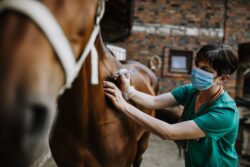Once you’ve found the one, you need to think about a number of other things. Read the SEIB horse insurance team’s top tips on how to go about purchasing your new best friend and then things to consider when you get them home.
Deposit
The seller may request that you pay a deposit to secure the sale, and to avoid any potential disputes we would always recommend that you have a written agreement on what circumstances the deposit would be returned or non-refundable. A prime example would be to have it agreed that if the horse were to fail the vetting, your deposit would be refunded.
Scammers
The British Horse Society have been made aware of sellers asking for financial deposits to secure a viewing of a horse, this is not required and we would not recommend exchanging money for viewings.
Loan with view to buy/trial periods
It’s always a good idea to take as much time as you can to decide if the horse is right for you, and a trial or loan period will provide you with exactly that. Both you and the seller can have more peace of mind that the new partnership is going to be a success, or agree that it isn’t right and walk away. When arranging a trial period or loan, ensure that all aspects are covered in writing, paying particular attention to whose responsibility it is if the horse is ill or injured during the period, and who covers the insurance costs.
Passports
Did you know that it is a legal requirement for all horses in the UK to be passported and microchipped? The BHS advise that you should not purchase a horse without a passport, and if you are having the horse vetted, ask the vet to check that the microchip in the horse matches the information in the passport.
Another legal requirement is that you have to update the details on the passport within 30 days of purchasing the horse, you do this by contacting the relevant Passport Issuing Organisation.
Vetting and insuring your new horse
We’d strongly recommend having the horse vetted before purchasing, for your own reassurance, and because it may be a requirement if you are looking to insure the horse.
Click here to read our blog on vetting and insuring your horse.
Getting your new horse home
This part of the process can be a bit of an emotional roller-coaster, you’re excited, anxious, cautious and eager to get going, but there’s often a few hoops to jump through at this stage too.
With the increase in awareness and management of Strangles and other highly infectious equine diseases, most yard owners will insist that your horse is isolated for a minimum of 21 days – whether that be in a stable or a separate field – and may ask for a blood test to be taken to see if your horse is a carrier of disease.

Once you have contended with the disease management side of things, it will be time for you and your new horse to settle into your new routine. This can be stressful for the horse, so remember to be patient, their world has been turned upside down and they may need extra time spent with them so that they can get to know you and their new surroundings.
About SEIB
SEIB have been arranging horse insurance for over 50 years. This experience allows us to tailor policies to suit your circumstances and ensure that you and your horses are covered should the worst happen.